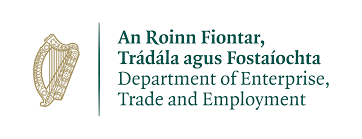Q: What is the Grant Application Process with Kerry LEO?
Our application process is straightforward and can be summarised as follows:
- Step 1: The project promoter telephones or meets with a member of staff to discuss their project proposal. If your business proposal is one that may qualify for financial assistance following discussion, you will be advised to complete an application form and provide supplementary information and documentation.
- Step 2: A completed application form, along with all of the necessary support documentation is then submitted by the project promoter.
- Step 3: Additional clarification or information may be sought by the Business Advisor/ Senior Enterprise Development Officer
- Step 4: The application is then submitted to the Evaluation & Approvals Committee for appraisal. This committee comprises members of the business community, financial institutions and local authority and they meet circa every two months. All documents relating to the application are submitted to the committee one week in advance of their meeting for consideration.
- Step 5: The Head of the Local Enterprise Office (LEO) informs the project promoter in writing of the Evaluation & Approvals Committee's decision. In the case of grant approval, a formal letter of offer and terms and conditions attaching to the grant aid will also be issued.
- Step 6: In the event of your project being deemed ineligible and/or not obtaining financial assistance from the LEO, you can discuss the project application and evaluation with your LEO to obtain further feedback and/or advice regarding the application. If you are not satisfied, you will be provided with written notification of the appeals process.
Q: How long does the process take?
The decision on your grant application is made by the Evaluation & Approvals Committee which meets circa every two months. Typically you will be waiting from 1-2 months for a decision depending on the date of your submission and the date of the next committee meeting.
Q. Are there grants or other supports for starting a business?
There are substantial supports for starting a business including advice, information, training, mentoring, social welfare allowances and reliefs, and sometimes direct grant aid assistance for researching a business idea, employing people or investing in equipment.
Businesses that receive grant aid are those that have been identified as having potential for providing long-term viable jobs. Therefore, the support agencies are interested in the areas of business that are innovative, fill new market niches, replace imported products or services, demonstrate good management skills and have the financial viability necessary to succeed. Although most start-up businesses do not receive cash grant aid, all can avail of information and advice..
Q. Why are some businesses never grant aided?
Grant aid assistance is targeted only at very specific sectors, regions or activities that have been identified as most likely to provide opportunities for economic and employment growth in Ireland. Boards cannot provide grants to business that may displace an existing business.
Extensive research has been carried out to identify the reasons for business failures. For example, some activities have already enough providers and the market cannot support any more. Other activities may only be viable if the company is of a certain size or can fulfil a specific product need.
Areas such as retail trade must compete in the open market to operate successfully and, as such, are never grant aid assisted as it would give that company an unfair advantage over others. Training in good management skills or technical improvements is often more valuable to these businesses in the long term.
Q. I have an idea for a new business. Where do I start?
You need to do some basic market research to establish that a market exists, its size and how you can access it, before contacting your Local Enterprise Office. You need to do more market research and write a business plan. You need to be clear on your market proposition. We also recommend that you participate on one of our "Start Your Own Business" Training Programmes.
Q. Do I need to write a Business Plan?
You can start a business without a business plan but you will have difficulties in raising finance or accessing support from banks or State Agencies without it.
Even if you don't need finance, a business plan provides an invaluable framework for planning how your business will proceed and later as a benchmark for assessing the health of your business. It ensures that you know what is going on in all aspects of the business and have a method for seeing how the activities interact.
Successful entrepreneurs will tell you that planning is 90% of the effort required.
Q. My business needs funding for capital equipment. Who will help?
Your Local Enterprise Office may be able to help if you meet the criteria. If this is not sufficient for your needs, you should enquire from the State body responsible for promoting industry in your sector (for example, Bord Bia or Bord Iascaigh Mhara) whether your business qualifies for one of their schemes. We are happy to point you in the right direction!
Q. Where can I get a low cost or interest-free loan?
The main banks all have specialist units to support small businesses, some which may offer special to start-ups. Microfinance Ireland may be a source of finance for the entrepreneur who has been unsuccessful in sourcing finance elsewhere.
Q. Are there any grants available for accommodation projects?
Kerry LEO does not offer grant aid towards accommodation projects. LEADER Groups may support these projects where there is not currently sufficient market supply.
Q. How do I get premises in an Enterprise Centre?
Generally, you need to apply to the owner of the centre . You may be offered premises if your business fits within the kind of activity the owners are promoting for the Centre. Within Kerry there is a wide range of available incubation and commercial space. Some examples include
Q. Can I start a business in my own home?
The use of a private residence for business purposes may require planning permission if there is a change of use. Contact the Planning Department of Kerry County Council to discuss the situation. You should also check with your mortgage provider or landlord, in case they have any objections, before you start to work from home.
Q. How do I register my business/business name?
You can register both with the Companies Registration Office. The CRO website (www.cro.ie) provides information on the process.
Q. Do I have to register for VAT?
Only if your turnover is in excess of (or you expect it to be in excess of) the thresholds €37,500 for services businesses or €75,000 for businesses selling physical goods. Below these amounts, you may choose to register but you should first obtain professional advice from your accountant. The Revenue Commissioners publish a "Starting a Business" guide and other leaflets, which may be obtained from any tax office, the Revenue Forms and Leaflets Service at (01) 878 0100, or the Revenue's website (www.revenue.ie)
Q. How do I source overseas employees?
EU nationals may work in any member State. Non-EU nationals require a work permit (except for certain categories of workers who qualify under the "Fastrack" scheme).
Q. I am not an EU citizen. What must I do before starting a business in Ireland?
A non-EU resident who plans to establish a business in Ireland must apply to the Department of Justice, Equality and Law Reform with:
- Evidence to satisfy the Department that he/she has sufficient funding available.
- A business plan.
- Details of professional or trade qualifications, where these are relevant to the proposed business.
- A "certificate of character" from the police authority in their home state, to confirm that they do not have a criminal record, etc.
In addition, the proposed business must employ at least two non-family members, who must be Irish or EU nationals. Work permits are not required for non-EU nationals who establish a business, though they may be required for any staff who move with the business.

